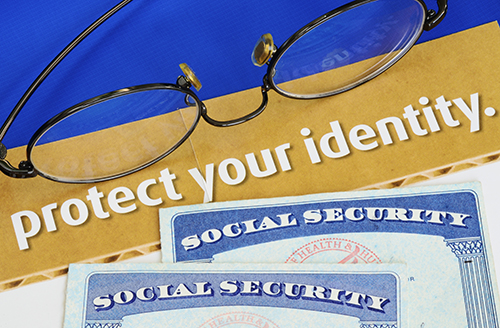Identity theft is a major problem in today’s world with statistics of over 10 million cases of theft and billions of dollars lost every year. There is a lot you can do to protect yourself and your family and the first is to prevent someone from accessing your information.
- Know where all your credit cards and documents are at all times.
- Only carry credit cards that you really need with you, checking regularly that they are still in your wallet or purse.
- Beware of how you display credit cards in public, who you have given the card to for payment, and if someone has an opportunity to make an illegal copy.
- Consider taking out a protection program for your credit cards – many companies offer them, but be sure that you know what you are getting in benefits and the total costs. Be careful, some plans are not worth the expense.
- Keep important information confidential and hidden even in your home, such as passwords, account numbers, etc.
- Keep paper information in a secure place, locked away or in a bank vault.
- Maintain sensitive information in your computer with password protection that you change regularly. Research how to create a strong effective password.
- Use a reliable Internet security program and firewall; keep them updated at all times.
- If you buy online, make sure the website shows “https:” in front of the website page, which indicates that it is a secure sight. Check online services that will verify that the company is legitimate.
- If you are really uncomfortable or unsure of the security of your computer, order by phone rather than put your information out over the Internet.
- Ignore suspicious emails, such as those that claim you have ordered something that you know you have not or that you have won something - they are just looking for you to give them your personal credit card information.
- Beware of phony emails from large corporations that request you verify your account or “update your information. Large companies or corporations such as PayPal or EBay will not ask for personal information by email, but they are major targets for email fraud and identity theft.
- When you receive your paper mail, shred any information with personal information or offers, such as credit cards, mortgage applications, etc.
- When disposing of records either shred them yourself or if there is a lot of paper, take it to a professional shredding company.
- If you get a new computer and discard an old one, make sure you have truly destroyed the data on the hard drive. Ask for professional help if you do not know how to do this.
If you do suspect fraud or theft, take action quickly.
- Contact a credit report bureau - you are entitled to a free credit report.
- Minimize loss and protect your credit card record by subscribing to a credit-reporting service.
- Check credit card bills and bank transactions carefully for all expenditures as soon as you receive them and call the company immediately to verify anything suspicious.
- If you do encounter credit card fraud, cancel the current card, discontinue use, shred it, and obtain a new card. The credit card company will employ means to track the offenders and recover the funds.
Do not wait to act if you find there are problems - the longer it goes on, the more it can undermine your credit. A preventative approach is easier than having to handle the difficulties caused by "identify theft."












